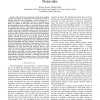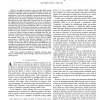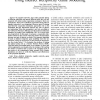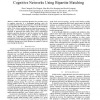127
click to vote
INFOCOM
2011
IEEE
14 years 5 months ago
2011
IEEE
—There has been recent interest within the networking research community to understand how performance scales in cognitive networks with overlapping n primary nodes and m seconda...
115
click to vote
TCOM
2011
14 years 9 months ago
2011
—In cognitive networks, since nodes generally belong to different authorities and pursue different goals, they will not cooperate with others unless cooperation can improve their...
134
click to vote
JSAC
2011
14 years 9 months ago
2011
—Opportunistic spectrum access creates the opening of under-utilized portions of the licensed spectrum for reuse, provided that the transmissions of secondary radios do not cause...
127
click to vote
GLOBECOM
2010
IEEE
15 years 2 days ago
2010
IEEE
In cognitive networks, since nodes generally belong to different authorities and pursue different goals, they will not cooperate with others unless cooperation can improve their ow...
111
click to vote
GLOBECOM
2008
IEEE
15 years 3 months ago
2008
IEEE
—Conflict free spectrum allocation for secondary users in cognitive networks is a challenging problem, since the accessible spectrum is shared among users. The problem becomes to...
145
click to vote
ICC
2007
IEEE
15 years 6 months ago
2007
IEEE
In this paper, the problem about power control in multiuser cognitive networks is addressed. The scenario we study is a heterogeneous network, where multiple cognitive (without the...
117
click to vote
ICC
2007
IEEE
15 years 8 months ago
2007
IEEE
— Cognitive networks are the latest progression of cognitive functionality into the networking stack, an effort which began with a layer one and two focus on cognitive radios, an...
132
click to vote
SAC
2010
ACM
15 years 9 months ago
2010
ACM
Modern networks are very complex. It is highly desirable to reduce management complexity in next generation network design. Researchers have been seeking inspiration in natural ob...




